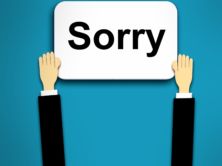
(Tijl Vercaemer via Flickr)
Globe and Mail public editor Sylvia Stead recommended journalists at her newspaper abide by ethical guidelines when reporting on suicide in light of Robin Williams’ death this week.
The paper also purposefully withheld reporting some of the details of Williams’ death, even though they were available after the Marin County Sheriff’s Office told reporters at a press conference, in order to act ethically, Stead blogged this week.
“Even though it was public information, that did not mean that The Globe should have followed in lockstep with those details,” Stead wrote.
Stead also pointed out that Williams’ death can serve as “a very wide opportunity for the media to talk about this public health issue” for reporting on depression and mental illness.
Stead said she advises journalists abide by the Canadian Journalism Forum on Violence and Trauma’s standards for reporting on suicide.
She noted as an example of a standard that the Globe and Mail followed:
“How we talk about it is important. For example, the focus should be on the tragedy and not the details of the act. In online coverage yesterday, The Globe’s articles said Mr. Williams died by asphyxia due to hanging. In my view, that was as much as should have been said about his death. The how is not important.”
Stead also recommended journalists don’t say “commit suicide,” instead opting for other terminology like “died by suicide.” Why? “Although commit can mean a number of things, it has been associated with doing wrong as in committing a grave error or committing a criminal act such as murder or fraud,” Stead explained. “We don’t normally associate the word ‘commit’ with a mental health tragedy.”
The Guidebook
The ethical guidelines Stead referred to are published in a guidebook titled, “MINDSET: Reporting on Mental Health.”
In the foreword to that guidebook, Globe and Mail health columnist Andre Picard argued “the single most influential change that the media can (and should) make is to start treating mental illnesses the way they do physical illnesses. With curiousity, compassion and a strong dose of righteous indignation when people are mistreated or wronged.”
He called for journalists to be “willing,” “dogged and thorough” and “determined” in their reporting on mental illness.
“They should cover suicides the same way they cover murders, seeking to find answers about the causes, while mourning the dead, flaws and all,” Picard wrote. Picard also recommended journalists use language carefully.
“We have to be conscious about the impact of outdated, prejudicial turns of phrase.” Some examples listed as inappropriate to use:
- “committed” suicide
- “died suddenly”
- “he snapped”
The guidebook said it is “based on three propositions which we found were widely supported by mental health professionals we consulted or interviewed:
- “The lion’s share of stigma is generated and reinforced by very rare, highly shocking, well-publicized instances of violence by people affected by very serious untreated illness.
- “Attempts to counter the emotional impact of such stories by generating more positive news about mental illness are commendable, but unlikely to succeed on their own.
- “Censoring or playing down coverage of major incidents of psychotic behaviour leading to death or serious physical harm is not an option in an open society.”
In response, the guidebook recommended two ways to “make a real difference.” They are:
- “Journalists should train some of their investigative skills on mental heath issues with persistence, fearlessness and vigour. Ultimately, the best way to reduce the number of stories about horrific acts by people in psychotic episodes is to probe why these incidents continue to occur.
- “In all their work, reporters and editors should be aware of the damage that can be done by reinforcement of stereotypes and strive to minimize it.”
As one example of misinformation, the guidebook said, “With the exception of a tiny minority, most people diagnosed with a mental illness are significantly more likely to be the victims rather than the perpetrators of violence. But this is seldom recognized by the public at large.”
The guidebook also contains a “best practice checklist” that includes:
- Avoiding stereotypes
- Not calling someone “schizophrenic” but instead “people with schizophrenia”
- Include “those affected or others like them” and “professional advice,” when possible
It also has a list of “Interviewing Dos and Donts” to help reporters when covering mental illness.
The guidebook provides information about numerous disorders like anxiety, eating and bipolar disorders.
When covering suicide, the guidebook recommends reporters:
- “Don’t romanticize the act”
- “Don’t jump to conclusions”
- “Don’t go into details about the method used.”
- “Don’t call suicide ‘successful’ or attempted suicide ‘unsuccessful.’ Death is not a matter of success”
- “Don’t use or repeat pejorative phrases such as ‘the coward’s way out’ which reinforce myths and stigma.”
Check out the guidebook in full and all of its recommendations and checklists here.
See all of iMediaEthics’ reports on Robin Williams. Some of the ethical issues in the media have included
- Radar Online publishing a photo of Williams at an Alcoholics Anonymous meeting
- CBS and San Francisco-CBS affiliate KPIX interviewing an employee about seeing Williams at an AA meeting
- A UK TV news station airing a clip of Williams saying “hang me” in a 1987 movie
- Fox News’ Shepard Smith apologizing to Williams’ family after suggesting Williams was a “coward” and
- ABC News showing a live feed of video footage of outside Williams’ house after the news of his death
iMediaEthics has written numerous times about ethical guidelines in reporting on suicides.
In 2012, the UK Sun had to undergo training for reporting on suicide after a complaint to the UK Press Complaints Commission (PCC).
Also in 2012, the PCC ruled that a local newspaper, the Wiltshire Gazette & Herald, published too much information about a suicide.
The Ottawa Suicide Prevention Coalition contacted media outlets in 2012 with its guidelines for reporting on suicide.
In 2011, the Australian Press Council issued new guidelines for reporting on suicide.
Also in 2011, the Toronto Star public editor Kathy English questioned how the media covers suicide.
In 2010, Edward Wasserman, then the journalism ethics professor at Washington and Lee University, blogged with some guidelines for reporting on suicide.
UPDATE: 8/16/2014 7:33 PM EST Cliff Lonsdale, the president for the Canadian Journalism Forum on Violence and Trauma, which released the Mindset guidelines, told iMediaEthics more about the standards.
“Media have certainly been contacting us” about Robin williams’ death, “but mostly because they want us to comment on the coverage,” Lonsdale wrote by e-mail.
He said that the forum has “distributed about 3,000” sets of the free guides, in addition to the online downloads of the guidelines.
According to Lonsdale, the forum is “an educational charity with senior journalists and mental health people on our board and in our membership.” The organization is “entirely run by volunteers,” many with journalism experience.
“Our primary focus is on the physical and mental wellbeing of journalists themselves,” Lonsdale wrote. “By extension, we’re also concerned with the impact they have on those around them (families, significant others) and those they write about or those who read what they write. That’s where Mindset comes in.”
Lonsdale said that one of the things that distinguishes Mindset from other guides for reporting on mental health is that it was written by journalists. Lonsdale wrote:
“There are lots of third-party guides to mental health reporting, suicide, etc. out there – but they are nearly all written by people who don’t really understand journalism and don’t have the journalists’ trust. This lack of perspective frequently shows – and a lot of good advice gets thrown out with the bad, as a result.”
Because of the influence and participation of journalists in the forum and the Mindset guidebook, Lonsdale said the organization is more realistic.
“Our street cred means when we tell fellow-journalists what to avoid and why, they are more likely to listen,” he wrote. “We don’t say: ‘Never put suicide on the front page, or in a headline,’ for example. That’s plainly ridiculous, no matter what the WHO’s group of experts thinks. If our prime minister or your president kills himself, it’s not going on page 3.”
By relating to journalists, he thinks the organization and guide are more effective as well. He explained:
“Journalism exists for a valid purpose and we can’t suspend that to satisfy people with other priorities. Once journalists know you share that view, they’re very willing to listen and to try to make a difference – by reducing collateral damage, by getting past the “oh, wow!” to the “Oh, why?” and so on. ”
To put it succinctly, “the bottom line is that journalists know we’re after better journalism, not trying to turn journalism into something it isn’t and shouldn’t be.”
Further, Lonsdale noted that mental health issues impact a lot of people so it’s important to ensure proper reporting. He wrote:
“Journalism has played an important role in throwing light on other issues of this magnitude – cancer, sexual assault, to name just two. We want journalists to see writing about untreated mental illness, its consequences and the underlying structural problems in much the same way. These are big stories that need to be told, no things to back away from or become scared or confused about. If journalists do their proper job here, we will all be better for it – because we’re all likely to find ourselves somewhere on that very broad continuum of mental illness some time in our lives.”






Comments Terms and Conditions